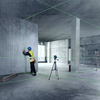How to Adjust a Survey Bipod for Accurate Measurements?
When it comes to quick setups or situations where a surveyor needs to act quickly, a survey bipod is the best tool for the job. It is a specialized piece of equipment, set on two legs, meant to hold various surveying equipment, such as a theodolite, or a GPS recevier.
The idea is of course for it to hold the equipment as stable as possible to conduct any land surveying tasks. However, it does come with its shortcomings which is the main reason why people resort to tripod rather than bipods. Nevertheless, they still have their advantages, and people from the industry are using them on a regular basis.
To help you understand the importance of bipods for surveying, we will address their advantages and disadvantages, but will also explain how to set up a surveyor's bipod.

1. Pre-Adjustment Preparations
Start by inspecting your equipment. Check the survey bipod legs for wear or potential damage. Be sure that the legs are free from debris and check all the joints and connections so they can provide adequate stability.
2. Initial Setup and Positioning
Be sure to pick a good point and stable ground where to set up your equipment. Spread the legs to ensure optimal stability. You can pin them down to the ground so when you move your legs to fine-tune, you don’t need to drag them on the ground and mess everything app. Make sure to set the adequate bipod height so as to match your surveying equipment and their uses.

3. Fine-Tuning the Bipod
After you secure the legs to prevent movement, you need to adjust the head to ensure it is level. Each bipod comes with a bubble level to help you level it up and two buttons on the side to help expand and move the legs. After you let go of the buttons, the legs are locked in and they won't move anymore.
4. Securing the Surveying Instrument
Now comes the time to attach the needed survey bipod parts. Mount the instruments you need and ensure that they are tightly secured and balanced. You can use the surveying bipod prism pole so it helps you with the balance and also allows you to mount added equipment which may even allow you to do various GPS surveys.
5. Practical Tips for Accurate Measurements
While surveying, you might need to re-adjust the bipod from time to time. Being that it is not as stable as a surveyor tripod, checking if it is level from time to time will help it be more effective. Also, make sure that all the instruments that you using are clear.






